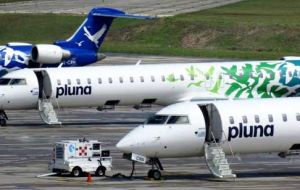MercoPress. South Atlantic News Agency
Canadian company still interested in recapitalization of Uruguay’s national airline
 A bad year for Chorus Aviation, in April it lost the Thomas Cook Canada contract and now Pluna
A bad year for Chorus Aviation, in April it lost the Thomas Cook Canada contract and now Pluna Chorus Aviation Inc. says it is working with the Uruguayan government on the recapitalization of the country’s flag carrier Pluna, just days after the Canadian company said it won't invest more money to bail out the airline.
Uruguay which owns a 25% equity interest in the national carrier, took control of its operations to allow it to continue operating.
In 2010, Jazz — as it was then called — invested 15 million dollars to acquire a 25% stake in Pluna which connects the capital Montevideo to several neighbouring countries.
The Halifax-based company said Thursday it is working “directly and co-operatively with the Uruguayan government to produce and assess potential recapitalization and business plans for Pluna.”
“We're working closely with the government in trying to find a solution,” Chorus spokeswoman Manon Stuart said in an interview.
Last Friday, she said Chorus would not invest additional funds.
“I can't say one way or the other: it's just too early in the process. We really have to wait for the outcome of the review,” Stuart said, noting that the “situation is evolving.”
As part of the proceedings, all of the shares in Pluna — including ones held by Chorus through Latin American Regional Aviation Holding Corp. — have been delivered in trust with the Montevideo Stock Exchange in return for certain conditions and indemnities from the Uruguayan government.
Chorus said there is no guarantee that a successful recapitalization will be accomplished and that Chorus will retain an equity stake or investment in the airline.
The company is also assessing whether to take a write-down of its investment during the second-quarter results to be released in mid-August.
Pluna's problems mark the second failed attempt by Chorus to become less dependent on Air Canada, its former parent company for which it provides regional service under a capacity purchase agreement.
In April, tour operator Thomas Cook Canada Inc. made an early exit from its five-year agreement with Chorus, citing market conditions. The contract provided 100 million dollars in annual revenues.
Chorus operated a fleet of six Boeing 757 jets for the British vacation company since 2010 to sunny destinations during the winter season, including the Caribbean, Mexico and Central America. The deal had another three years left.
Pluna's bankruptcy could also have important implications for Export Development Canada. The Crown corporation provided a 120 million dollars guarantee for the purchase of Bombardier CRJ900 regional jets in 2010 and 2011.
Pluna’s debts according to Uruguayan congressional estimates could reach over 300 million dollars plus a 25 million dollars fuel bill with the country’s oil refining monopoly, Ancap.
The original contract of Pluna with Latin American Regional Aviation Holding Corp that had a majority stake of 75% was questioned several times in the Uruguayan congress from the very start given the insufficient record of the holding involved and their representatives since none of them had any experience in the air industry.
Furthermore the private majority partner of Pluna never completed its share of capital according to contract.
In the purchase of the new fleet of Bombardier was also involved the Nova Scotia bank which also happened to acquire a Uruguayan bank made up of the recoverable assets from several banks that went down during the financial crisis of 2001/2002 that spread from Argentina to neighbouring Uruguay.
The bank which originally absorbed most of the toxic assets from other banks that collapsed was purged and turned into a viable institution finally acquired by the Canada’s Nova Scotia.




Top Comments
Disclaimer & comment rules-

Read all commentsSo now it's still the US$ 301.1 million PLUS US$ 25 million for ANCAP!
Jun 22nd, 2012 - 12:55 pm 0Just where did that factura come from? Out of the woodwork by the sound of it OR, MORE LIKELY, knowing how 'efficient' ANCAP is, somebody told the accounts department to check WTF was going on!
Just WHEN are Uruguay going to operate nationalised businesses properly? I think we all know the answer to that one.
Commenting for this story is now closed.
If you have a Facebook account, become a fan and comment on our Facebook Page!